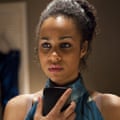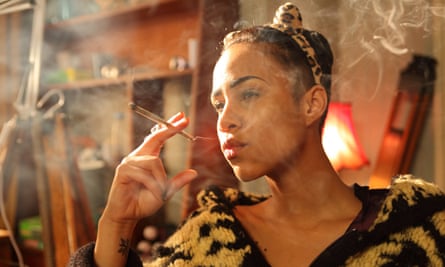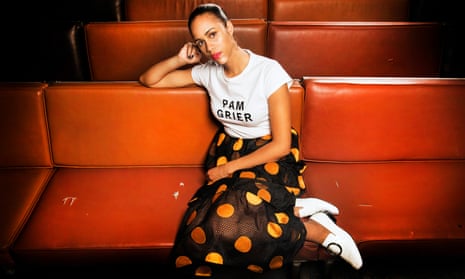Zawe Ashton had nipped into an east London charity shop to buy some cheap emergency trousers when a man grabbed her by the arm, gave her a shake and told her: “You’re dead! You’re the woman that died!” Ashton had earlier spilt her lunch on her leg on the way to a meeting. Alive, but flustered, she mumbled an awkward “Thanks for watching”, and made a speedy zigzag to the shop till.
Ashton played Joyce Carol Vincent in the 2011 docudrama Dreams of A Life. It was the extraordinary story of a real, living, breathing woman; a person who lived alone in her London tower-block flat and was wrapping Christmas presents in her armchair when she died. She wasn’t found for three years. The TV was still on. Vincent’s life – and the little that was known about it – is one that still haunts me, having first read film-maker Carol Morley’s piece in the Observer.
“Thank you for saying that,” says Ashton. “Because lots of other people thinking about it should have the freedom to say that because it taps into so many different emotions, it taps into so many different taboos that we don’t often talk about: the women who slip through the cracks of society, the women of colour who have so many projections thrown at them.” But it was mostly Vincent’s life itself, I say – it resonated because it was devastatingly, inexplicably true. Ashton pauses. “What sometimes annoys me about the arts,” she says, mildly defensive, “is increasingly that we have to put real people on screen or stage. We love real people, we love real scenarios, but what Carol did with that film was to put an artistic lens on a story so it will last the test of time.”

Ashton and I meet in the Shoreditch office of a media production company. “I always play outsiders,” she says. “I think I’m carrying a lot of those characters and I wonder if I play them because those characters need an extra element of thought to bring them to life.” She mulls it over and smooths her silk white dress, sleeveless and polka-dotted in blue, her makeup minimal and bobbed hair pulled back. A platter of crisps and strawberries rests untouched on table. “I’m someone who is interested in the process of reactions that last beyond the work. I’m a card-carrying existentialist.”
Ashton is hosting a selection of films for Channel 4’s late-night strand, Random Acts. It’s one of the station’s post-pub, arty oddities – the stumbled-upon shorts by artists that wouldn’t see a mainstream commission because they’re “deemed too bonkers”. Ashton’s series includes a poetic three-minute fashion film, written, produced, starring and directed by her. “And paid for! I stumped up all the money, hoping I might make it back somewhere else one day – it hasn’t happened yet.” Another of her short films, a quietly lovely exploration of the conceptual artist Lorraine O’Grady, has just premiered at Tate Modern, as part of the Soul of a Nation show.
“I do consider myself an artist,” she says. She’s been thinking on the word for a while now, rolling it around until it feels comfortable. Ashton has been an actor since she was six years old, when a commitment to Anna Scher’s theatre school swallowed every Friday night and Saturday afternoon all the way through her teens. She has been a film-maker, writer, producer and director along the way, but being an artist offers all-encompassing freedom: she doesn’t balk at sounding pretentious; she happily talks about her angst, the “fluidity of personality”, and “the feelings that course through your body if someone approached you in the street, trembling because of a part you’d played”.
She is best known, of course, as Vod, the scene-stealing, bovver-booted, androgynous hero of Channel 4’s Fresh Meat, created by Peep Show’s Jesse Armstrong and Sam Bain. The comedy about six Manchester students ran for five series between 2011 to 2016; Ashton was brilliantly dour and endlessly quotable in it. “Weirdly, people recognise me more as Vod now than when it was on,” she says. “Maybe it’s the whole catch-up thing, I dunno. It’s very confusing.” As Vod (whose life motto would be: “God has given me a brain and I’m choosing to do some pretty wicked things to it”), she was tough and blunt. In person, Ashton sounds a lot lighter, much softer – and she’s more self-conscious. A few times, her accent slips from casual estuary to mannered drama school.
“You rarely get to live in a body and mind that gives as little fucks as Vod. And I’ve not known a cast bonding like that.” She laughs. “I mean, this is so geeky, it’s like: ‘Why have you guys not moved on?’ But there was a storyline in the final series where the JP character fucks off revision and hires a barge. So, last summer we all fucked off and hired a barge – six of us recreated that storyline.” She mugs a mock-embarrassed face. Yet, sweetly, the six on-screen housemates share a real-life Whatsapp group; she woke up to 17 messages on it this morning. “No, I can’t read out many things from this thread. I’ve just spotted ‘Special minge’ on it. I don’t even know who that is.”

Ashton has had a good showing at Channel 4: she seems an essential part of the family. Last year, she starred in Not Safe for Work, a six-parter about thirtysomething office life as a civil servant. “Just because you seem a family on the outside, doesn’t make you infallible,” she says. “It was a huge disappointment for me that Not Safe for Work didn’t get commissioned again. It felt like the most Channel 4 thing that Channel 4 had done in a while.” Admittedly, it was a sleeper success. “More than a sleeper,” she yelps. “It slept a bit and fell into a coma. In terms of how the channel pushed it … even if you’re in the heart of an organisation like Channel 4, you’re always hoping you’ll get a certain outcome and it doesn’t always work that way. It’s like, like …” She flaps. “Do you ever get that thing when you’re on the first day of your period … your brain?” I laugh. We discuss the scientific study making headlines this morning claiming hormonal brain drain isn’t a thing. “Oh, it’s a thing! Science. Science isn’t always right. Look at climate change,” she adds, drolly. “It doesn’t exist!”
Ashton is not much up for taking stock of her career or ambition; she won’t even tell me how old she is. “It’s such a journo question to ask.” It’s basic biographical information! “It’s more about the inflection the reader can put on you. It’s a bit boring.” It’s a standard question. “It’s lazy.” Having said that, I joke, she looks great for 67. “It’s not about looks for me.”
What she will say is that she’s taking some downtime to work some more on her book. The daughter of two teachers (her Ugandan mother met her cockney father in the 70s), with two siblings, Ashton is big on breaking convention. “I don’t like competition or aggro in my life – I avoid it – but there’s definitely something in me that’s comfortable with challenging the status quo.”
How does she define that? “I think every actor has a list of roles they’ve done, a list of roles they didn’t get and a list of roles they consciously turned down. So I suppose if you looked at those three lists for me, it would probably tell you a lot.” Apart from the rule she learned from Paddy Considine – “one for you, one for the CV, one for the wallet” – she won’t elaborate. How long has it been since she had the freedom to say no to playing a random black female character with no backstory? There’s an ‘mmm’. She skips the question to answer one of her own.
“What I get asked all the time is: ‘How do you do so much? How do you make it all work?’ And every time I’ve had to take a stance when I’m not taking work and doing something else to appreciate that the tapestry of stuff I’m doing now is a symptom of the moments when you feel like you’re losing some kind of agency in the acting world.” I’ve lost her thread but Ashton, who frequently flips between banter and big ideas, is unfazed.
What about outside of work? We’re running out of time and I’m still curious about what she’s interested in, where she goes out, who with, what she likes. “Would you ask a doctor or solicitor about their private life?” She seems mildly irate. “No one is interested in private lives, they’re not that interesting. This fixation on reality is the death of art.”
Random Acts returns to Channel 4 in August

Comments (…)
Sign in or create your Guardian account to join the discussion